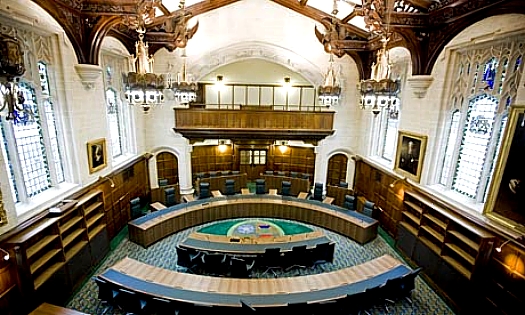
The Supreme Court has rejected a government appeal against a human rights ruling won by people who claimed their lives were blighted by past minor criminal convictions.
The judges found a revised criminal records disclosure scheme was “disproportionate” in some respects.
People need to disclose their criminal record when applying for certain jobs.
The government will have to consider reform of the system, said BBC legal affairs correspondent Clive Coleman.
Christopher Stacey, co-director of the charity Unlock, said it was an “important ruling”, which stands to affect thousands of people with old and minor criminal records who have been “unnecessarily anchored to their past”.
Supreme Court justices found that a revised criminal records disclosure scheme was “disproportionate” in two respects.
These were the requirement that all previous convictions should be disclosed, however minor, where the person has more than one conviction, and also in the case of warnings and reprimands issued to young offenders.
They announced their decision on Wednesday following the government challenge against a Court of Appeal judgment in 2017 over the legality of the scheme.
The appeal ruling backed the High Court’s 2016 finding that the scheme was “not in accordance with the law” within the meaning of Article 8 of the European Convention on Human Rights (ECHR), which protects the right to private life.
One case involves a woman, referred to in court as P, who was charged with shoplifting a 99p book in 1999 while suffering from a then undiagnosed mental illness.
She was bailed to appear before magistrates 18 days later, but due to her situation at the time failed to attend court, which meant she ended up with two convictions – for which she received a conditional discharge.
P wants to work as a teaching assistant, having previous experience of teaching, and has sought voluntary positions in schools. However, with each application she is required to disclose her historic convictions, which has the effect of leading to the disclosure of her medical history to explain them.
In another case, G was arrested at the age of 11 for sexually assaulting two younger boys, with offences involving sexual touching and attempted intercourse.
Police records indicated the sexual activity was consensual and carried out as “dares”, in the form of sexual curiosity and experimentation on the part of all three boys.
The Crown Prosecution Service decided it was not in the public interest to prosecute. G received a police reprimand in Sept 2006 and has not offended since.
In 2011, when working as a library assistant in a local college, he was required to apply for an enhanced criminal records check because his work involved contact with children.
The police proposed to disclose the reprimand with an account of the mitigation. As a result, G withdrew his application and lost the job. He has since felt unable to apply for any job requiring an enhanced criminal records check.
Their cases were heard alongside that of W, a man who – more than 35 years ago – was convicted aged 16 of actual bodily harm, and given a two-year conditional discharge.
Due to the categorisation of this type of offence, under the current rules the record will never come off his standard or enhanced Disclosure and Barring Service (DBS) check. However, the justices allowed the the government’s appeal regarding W. Those involved cannot be named for legal reasons.
Corey Stoughton, advocacy director of Liberty, said: “P made a mistake a long time ago and has been unfairly punished ever since.
“Using overly broad bureaucratic rules that deny people meaningful careers by forcing them to to carry a scarlet letter for life is both cruel and pointless.”
Mr Stacey from Unlock urged the government to take “prompt and considered action” and carry out a fundamental review of the wider DBS system.
He said: “Today is a crucial step towards achieving a fair and proportionate filtering system that takes a more calibrated and targeted approach towards disclosing criminal records.”
Source: bbc.co.uk






Be the first to comment